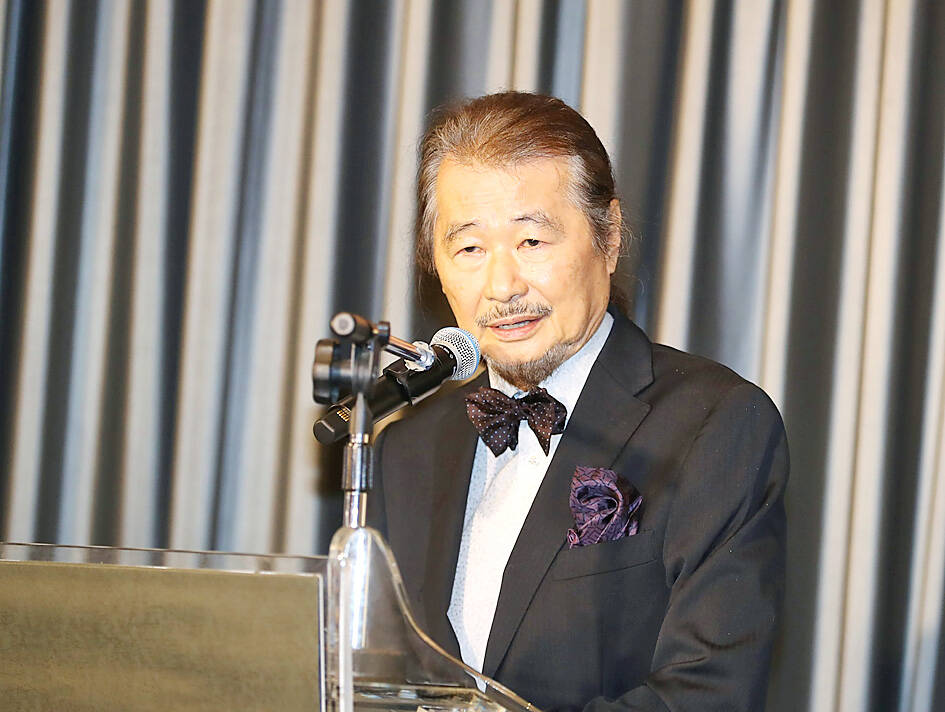President Tsai Ing-wen (蔡英文) and other politicians yesterday mourned the passing of veteran democracy activist Shih Ming-te (施明德).
Shih, a former Democratic Progressive Party (DPP) chairman, died at the age of 83 yesterday after battling cancer for years.
In a Facebook post, Tsai described Shih as a pioneer of democracy and human rights who devoted himself to the democratic movement during Taiwan’s authoritarian period.

Photo: CNA
Taiwan has navigated through periods of political party bans and newspaper restrictions, culminating in the eighth direct presidential election, said Tsai, who visited Shih in hospital on Sunday.
Tsai expressed gratitude to Shih for his dedication, stating that the public would “consolidate all our endeavors and persist in building a better Taiwan.”
Vice President William Lai (賴清德), who won the presidential election on Saturday, also paid tribute to Shih’s contributions and legacy on Facebook.
“Former chairman Shih was a trailblazer for democracy, a staunch defender of human rights, and a wise and courageous politician,” Lai said.
Shih, who dedicated his life and career to the advancement of human rights in Taiwan, has been called the “Nelson Mandela of Taiwan.”
He was jailed from 1962 to 1977 for sedition after calling for Taiwan’s independence from China, and again from 1980 to 1990 for his role in the Kaohsiung Incident.
Shih was chairman of the DPP from 1993 to 1996, and served as a lawmaker from 1993 to 2002.
He split with the party after then-president Chen Shui-bian (陳水扁) of the DPP became embroiled in several corruption scandals, later leading a mass movement calling for Chen’s resignation in 2006.
Chen, who was sentenced to 20 years in prison after being convicted on corruption and bribery charges in 2010, expressed his condolences on social media.
Reflecting on their shared history during the Kaohsiung Incident, Chen said he remembered watching Shih stand strong in front of the military court while serving as his lawyer.
On Dec. 10, 1979, Shih and other opposition leaders held a rally in Kaohsiung to commemorate Human Rights Day and call for democracy in Taiwan. The then-Chinese Nationalist Party (KMT) government cracked down on the demonstration and arrested Shih and the other leaders in what became known as the Kaohsiung Incident.
Chen said Shih had advocated throughout his life that Taiwan should move toward a Cabinet system.
“Prophets often tread a lonely path,” Chen said, expressing his conviction that, given time, Shih’s proposal for Taiwan to adopt a Cabinet system would become mainstream public opinion in Taiwan.
Taipei Mayor Chiang Wan-an (蔣萬安), a member of the KMT, conveyed his condolences on Facebook, adding that Shih had effectively fulfilled a role in monitoring the government, displaying profound compassion for the people residing in this land.

CHAOS: Iranians took to the streets playing celebratory music after reports of Khamenei’s death on Saturday, while mourners also gathered in Tehran yesterday Iranian Supreme Leader Ayatollah Ali Khamenei was killed in a major attack on Iran launched by Israel and the US, throwing the future of the Islamic republic into doubt and raising the risk of regional instability. Iranian state television and the state-run IRNA news agency announced the 86-year-old’s death early yesterday. US President Donald Trump said it gave Iranians their “greatest chance” to “take back” their country. The announcements came after a joint US and Israeli aerial bombardment that targeted Iranian military and governmental sites. Trump said the “heavy and pinpoint bombing” would continue through the week or as long

TRUST: The KMT said it respected the US’ timing and considerations, and hoped it would continue to honor its commitments to helping Taiwan bolster its defenses and deterrence US President Donald Trump is delaying a multibillion-dollar arms sale to Taiwan to ensure his visit to Beijing is successful, a New York Times report said. The weapons sales package has stalled in the US Department of State, the report said, citing US officials it did not identify. The White House has told agencies not to push forward ahead of Trump’s meeting with Chinese President Xi Jinping (習近平), it said. The two last month held a phone call to discuss trade and geopolitical flashpoints ahead of the summit. Xi raised the Taiwan issue and urged the US to handle arms sales to

A magnitude 5.6 earthquake struck off the coast of Yilan County at 12:37pm today, with clear shaking felt across much of northern Taiwan. There were no immediate reports of damage. The epicenter of the quake was 16.9km east-southeast of Yilan County Hall offshore at a depth of 66.8km, Central Weather Administration (CWA) data showed. The maximum intensity registered at a 4 in Yilan County’s Nanao Township (南澳) on Taiwan’s seven-tier scale. Other parts of Yilan, as well as certain areas of Hualien County, Taipei, New Taipei City, Taoyuan, Hsinchu County, Taichung and Miaoli County, recorded intensities of 3. Residents of Yilan County and Taipei received

Taiwan has secured another breakthrough in fruit exports, with jujubes, dragon fruit and lychees approved for shipment to the EU, the Ministry of Agriculture said yesterday. The Animal and Plant Health Inspection Agency on Thursday received formal notification of the approval from the EU, the ministry said, adding that the decision was expected to expand Taiwanese fruit producers’ access to high-end European markets. Taiwan exported 126 tonnes of lychees last year, valued at US$1.48 million, with Japan accounting for 102 tonnes. Other export destinations included New Zealand, Hong Kong, the US and Australia, ministry data showed. Jujube exports totaled 103 tonnes, valued at